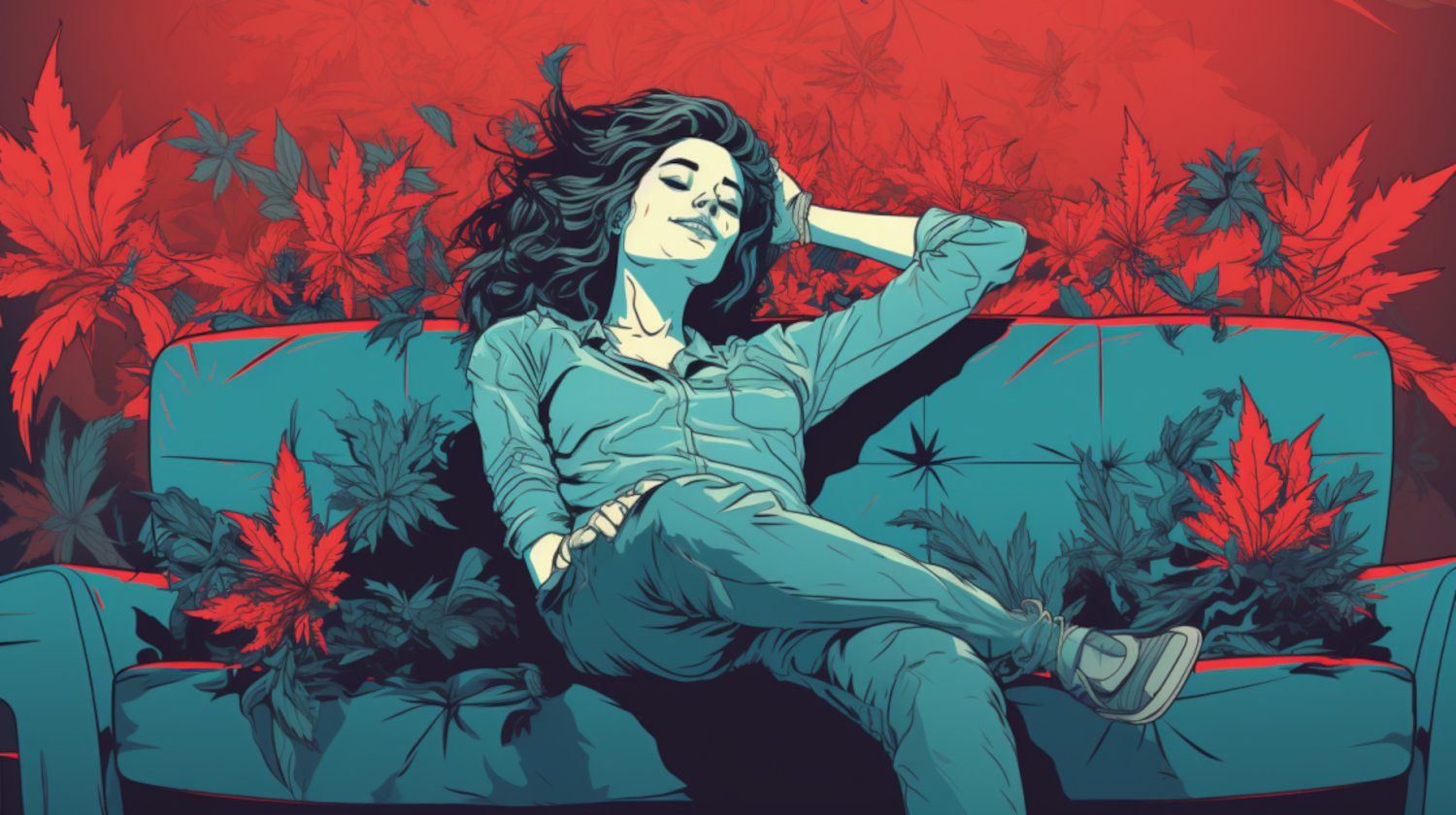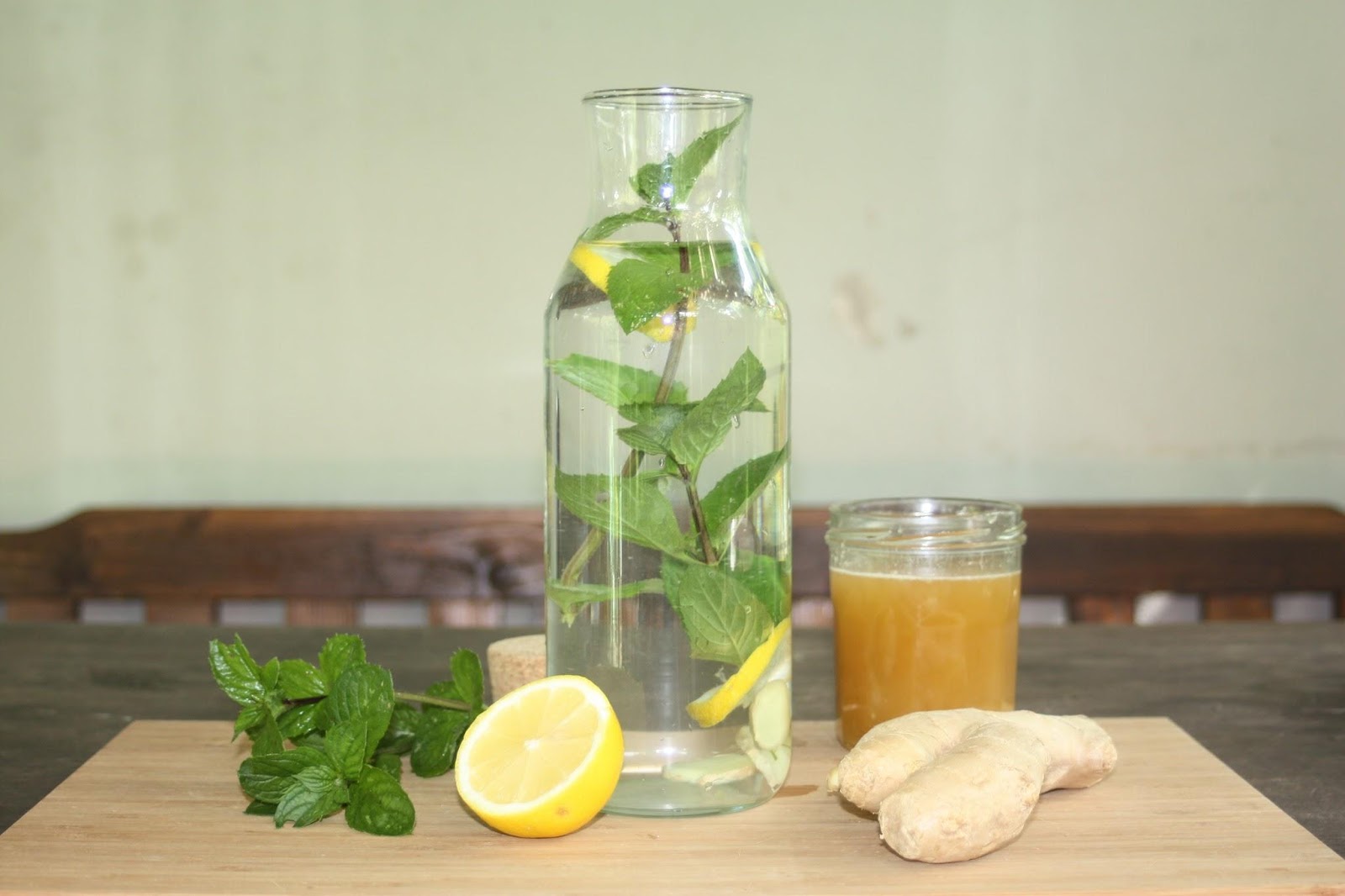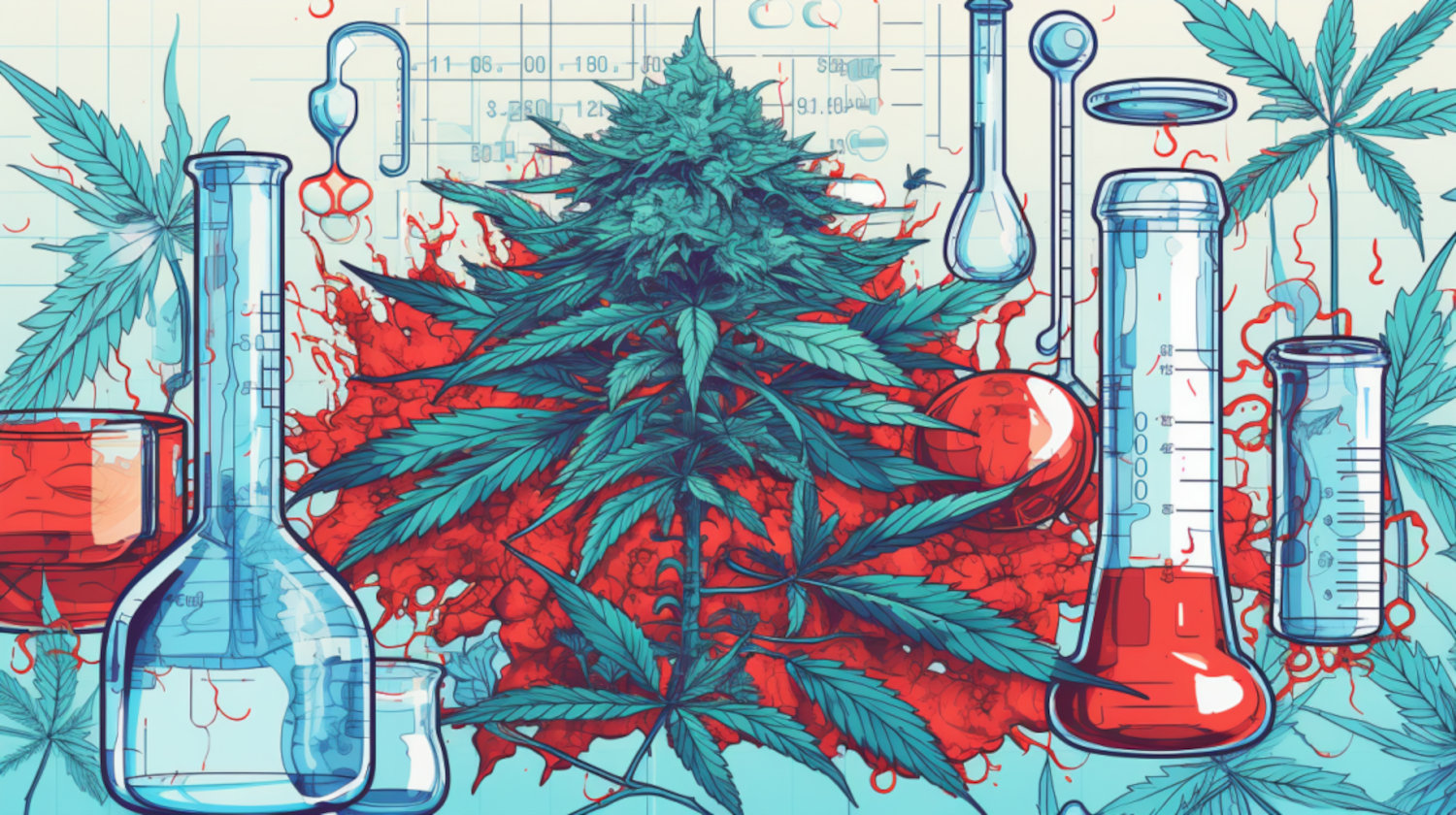In This Article
- What are the Signs of Being High?
- How Long Does It Take to Get Unhigh?
- 6 Ways to Get Unhigh
- What Affects a Person's High?
- How to Get Unhigh FAQ
- What is the fastest way to get "unhigh?"
- Can I overdose on cannabis?
- How do I know if I'm too high?
- What foods, drinks, and substances should I avoid so I don't prolong the high?
- When to Seek Help
- References
Key Takeaways
- Time is the only guaranteed way to sober up from cannabis.
- Staying calm, hydrating, and resting can help ease the experience.
- Avoid driving or operating machinery until you’re certain the effects of cannabis have worn off.
Cannabis can sometimes hit harder than expected, leading to discomfort or anxiety. And there may be times when you want to ease the intensity of THC's intoxicating effects.
While there's no substitute for time, there are tricks to lessen the perceived effects of cannabis until they subside. Some of these are backed up by research, while others are based on anecdotal reports.
Regardless of the method you choose, it's always best to play it safe and avoid driving or doing anything dangerous until you're sure you're no longer high – the next day is best.
What are the Signs of Being High?
Depending on who you ask and what you're consuming, your high may feel different than what the next person experiences. That's because various strains and consumption methods create a range of effects. At the same time, your body composition and other surrounding factors can all impact how you feel.
That said, research has combined decades of anecdotal feedback to provide some overarching expectations to give you a good idea of what to expect.
Some of the more commonly reported effects of cannabis consumption include:
- Euphoria
- Time and spatial distortion
- Intensification of ordinary sensory experiences
- Motor impairment
Adverse reactions have also been reported, including:
- Anxiety
- Paranoia
- Delusion or Hallucinations (A rare occurrence)
How Long Does It Take to Get Unhigh?
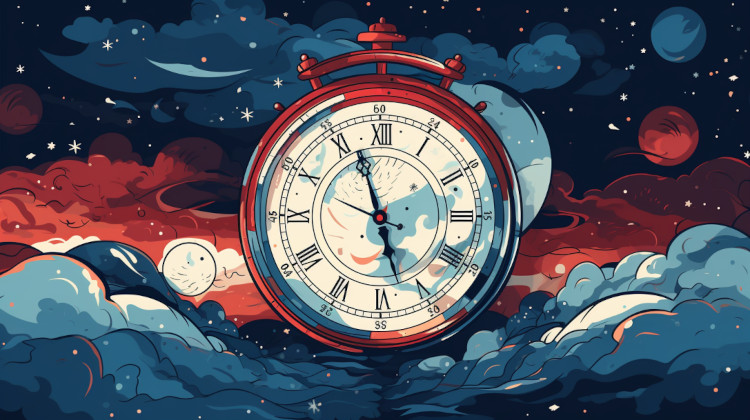
Not all products hit or last the same. Depending on their consumption type, consumers can expect to feel high for an average of 2 to 8 hours.
| Consumption Type | Typical Length of High |
| Smoking or Vaping | 2 - 4 hours |
| Edibles, Pills, and Capsules | 6 - 8 hours |
| Dabs | 2 - 4 hours |
| Tinctures | 6 - 8 hours |
If you're feeling too high, try these steps to help reduce the intensity:
- Hydrate: Drink water to help your body process THC.
- Rest: Find a quiet, comfortable place to relax.
- Distract Yourself: Engage in calming activities like listening to music or watching a familiar show.
- Avoid Stimulants: Steer clear of caffeine or other substances that might increase anxiety.
These methods won't eliminate THC from your system, but may help manage the experience until the effects lessen.
6 Ways to Get Unhigh
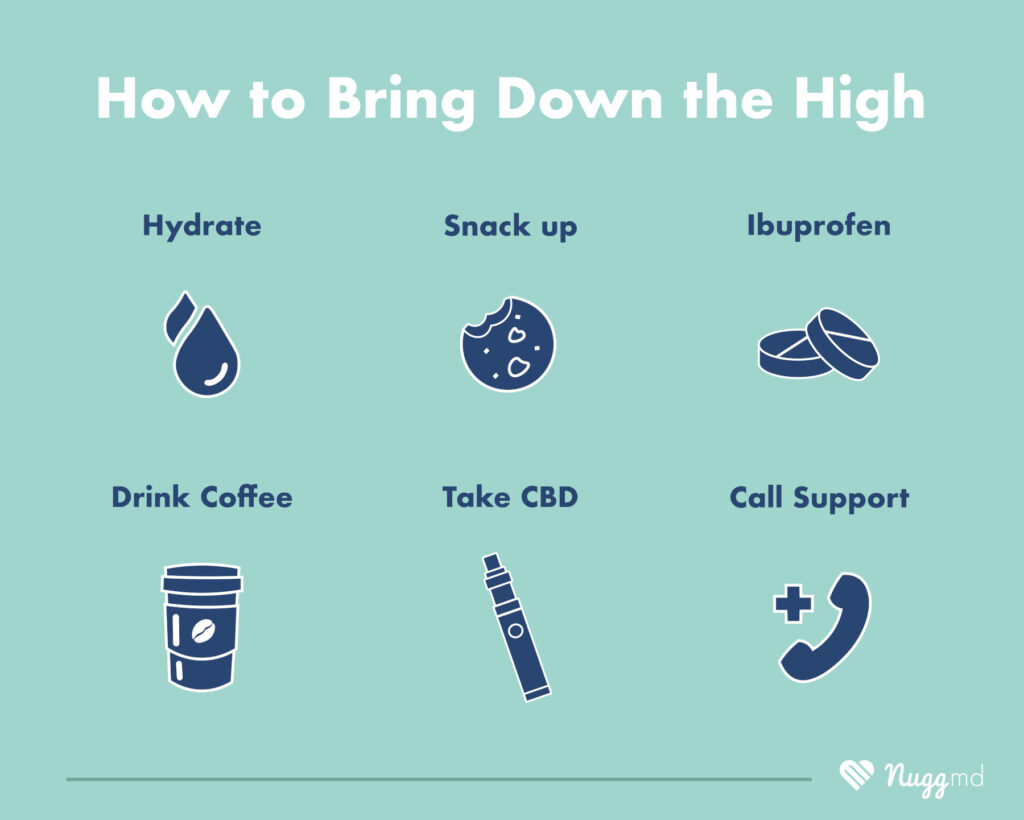
✔ Stay hydrated & drink plenty of water
Staying hydrated is the name of the game. It's actually the name of every game. If you're not staying hydrated, you may experience a range of adverse outcomes, if you're high or not. Whether you're dealing with the ability to hydrate or increased stress, drinking water could help lower stress and keep you calm.1
✔ Eat snacks
We're all aware of the munchies and how they can sometimes lead to overeating. But don't frown on getting a good snack or two. Certain foods will help satisfy cravings in an otherwise stressful or hangry moment.
However, one seasoning, in particular, could be beneficial to helping you bring down a high: black pepper. Black peppercorns, containing the terpenes pinene and caryophyllene, have been reported to deliver a sense of calm to the situation, likely due to these terpenes.2 Once you're done crushing them up and giving them a whiff, consider throwing them on some of your munchies. They work in numerous ways.
✔ Take Ibuprofen
Ibuprofen inhibits the enzyme COX-2, which is responsible for inflammation in the body.3 This enzyme may also cause lethargy and other adverse cognitive effects produced by THC.4 However, additional research is required to confirm the findings.
✔ Have a cup of coffee
Coffee has been used to sober people up for decades. Whether it's cannabis, alcohol, or other substances, a hot cup of Joe is synonymous with sobering up. Since cannabis has a tendency to produce lethargy and sedative effects, coffee may help boost energy via its caffeine content. Caffeine may also suppress the body's endocannabinoid system, which may lower the impact of the high in the process.5
✔ Take CBD or Terpene Recovery Shots
Those looking for a quick cannabis-based way to cut THC's effects short should consider CBD. An array of studies suggest that CBD lessens some of the effects of THC, including anxiety, cognitive deficiencies, and psychosis.6 However, other research indicates that CBD may not be effective in reducing cannabis effects, and high doses may even enhance the effects of THC.7 The lack of research means you should proceed with caution before using CBD to sober up from weed.
Alternatively, many consumers have begun turning to specialized products specifically designed to reduce the effects of THC. Cannabis recovery shots like those developed by High-Not use a blend of electrolytes and plant-based terpenes known for their potential to counteract THC effects.
✔ Call a Peer Support Line
Fireside Project is a psychedelic peer support line that provides help to individuals during and after a psychedelic experience. With a highly trained team of compassionate volunteers who listen without judgment, Fireside Project can offer the support many individuals may not have access to at home. Through their equity project, callers who are military veterans or identify as BIPOC or transgender can connect with a support line volunteer who shares that aspect of their identity.
What Affects a Person's High?
Various factors shape the length of a high. Each strain offers a unique plant profile, where compounds combine to create an effect known as the entourage effect. This can make the consumption outcomes different depending on plant genetics, cultivator, storage method, and age of the flower. Those differences could create a compendium of results – with more seemingly added almost every growing season as more genetics and crosses hit the scene.
Various other factors can affect the high's impact and how long it will last.
Dosage: Be aware of your dose and watch for more than just THC potency. Check the label or its lab results for the entire plant profile to understand the product's strength best and how much you should be consuming at any given time.
Metabolism: How your body processes and responds to cannabis and other compounds will impact the high you feel and how long it may last. Your metabolism can influence your cannabis experience in a variety of ways, including:8
- Absorption and distribution
- Onset time (how long it takes to feel high)
- Effect duration
- Tolerance
Tolerance: Newcomers and those with low tolerances may feel high for a bit longer or experience a more substantial high than a regular consumer might. Experienced cannabis consumers are more likely to be able to handle the effects of more potent strains as well as consumption methods like edibles, which are known to deliver more potent effects. If you're starting out or haven't had a significant history with those sorts of products, stick to micro or low doses and build up from there.
How to Get Unhigh FAQ
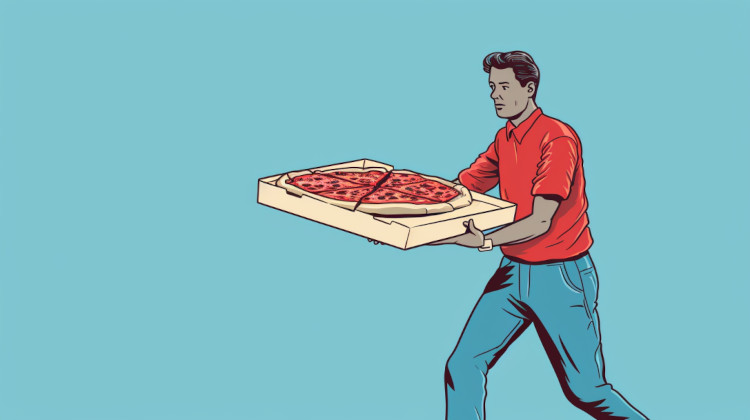
What is the fastest way to get "unhigh?"
It depends on your preferred method and your belief in current clinical studies. Black pepper is believed to lessen the effects in moments to a few minutes. CBD has been reported to do the same. That said, you may want to lean towards pepper since there is more of a definitive clinical conclusion around it. However, certain lab studies suggested CBD could provide similar, if not greater, efficacy.
Can I overdose on cannabis?
There has never been a reported fatal overdose on cannabis alone. However, people can still experience various adverse effects that could make for an uncomfortable couple of hours or longer. Still, if you're genuinely concerned for your safety, it's always best to err on the side of caution and seek medical attention.
How do I know if I'm too high?
You'll need to check with yourself to get a definitive answer on that one. But some classic adverse effects to look out for include nausea, disorientation, extreme lethargy, and other effects on your cognition. Feeling too high may result in you being stuck on the couch for prolonged periods. Or it could mean bouts of vomiting in more extreme cases. Observe how you feel while under the influence and note your comfort level to determine if you are too high.
What foods, drinks, and substances should I avoid so I don't prolong the high?
Fatty foods can increase the rate of absorption of THC, which could lead to a longer-lasting high.9 Try snacking on fresh fruits and vegetables, and avoid greasy, fatty, or fried foods.
When to Seek Help
Most cannabis experiences pass without issue. However, adverse reactions can happen, especially with high doses or edibles. If you feel uncomfortable or at risk, put your safety and peace of mind first and contact a healthcare professional.
References
- Haghighatdoost F, Feizi A, Esmaillzadeh A, et al. Drinking plain water is associated with decreased risk of depression and anxiety in adults: Results from a large cross-sectional study. World J Psychiatry. 2018;8(3):88-96. Published 2018 Sep 20. doi:10.5498/wjp.v8.i3.88
↩︎ - Weston-Green K, Clunas H, Jimenez Naranjo C. A Review of the Potential Use of Pinene and Linalool as Terpene-Based Medicines for Brain Health: Discovering Novel Therapeutics in the Flavours and Fragrances of Cannabis. Frontiers in Psychiatry. 2021;12. doi:https://doi.org/10.3389/fpsyt.2021.583211
↩︎ - Orlando BJ, Lucido MJ, Malkowski MG. The structure of Ibuprofen bound to cyclooxygenase-2. J Struct Biol. 2015;189(1):62-66. doi:10.1016/j.jsb.2014.11.005
↩︎ - Chen R, Zhang J, Fan N, et al. Δ9-THC-Caused Synaptic and Memory Impairments Are Mediated through COX-2 Signaling. Cell. 2013;155(5):1154-1165. doi:https://doi.org/10.1016/j.cell.2013.10.042
↩︎ - Cornelis MC, Erlund I, Michelotti GA, Herder C, Westerhuis JA, Jaakko Tuomilehto. Metabolomic response to coffee consumption: application to a three-stage clinical trial. Journal of Internal Medicine. 2018;283(6):544-557. doi:https://doi.org/10.1111/joim.12737
↩︎ - Boggs DL, Nguyen JD, Morgenson D, Taffe MA, Ranganathan M. Clinical and Preclinical Evidence for Functional Interactions of Cannabidiol and Δ9-Tetrahydrocannabinol. Neuropsychopharmacology. 2017;43(1):142-154. doi:https://doi.org/10.1038/npp.2017.209
↩︎ - Zamarripa CA, Spindle TR, Renuka Surujunarain, et al. Assessment of Orally Administered Δ9-Tetrahydrocannabinol When Coadministered With Cannabidiol on Δ9-Tetrahydrocannabinol Pharmacokinetics and Pharmacodynamics in Healthy Adults: A Randomized Clinical Trial. JAMA network open. 2023;6(2):e2254752-e2254752. doi:https://doi.org/10.1001/jamanetworkopen.2022.54752
↩︎ - MacCallum CA, Russo EB. Practical considerations in medical cannabis administration and dosing. European Journal of Internal Medicine. 2018;49(49):12-19. doi:https://doi.org/10.1016/j.ejim.2018.01.004
↩︎ - Zgair A, Wong JC, Lee JB, et al. Dietary fats and pharmaceutical lipid excipients increase systemic exposure to orally administered cannabis and cannabis-based medicines. Am J Transl Res. 2016;8(8):3448-3459. Published 2016 Aug 15.
↩︎
The information in this article and any included images or charts are for educational purposes only. This information is neither a substitute for, nor does it replace, professional legal advice or medical advice, diagnosis, or treatment. If you have any concerns or questions about laws, regulations, or your health, you should always consult with an attorney, physician or other licensed professional.

